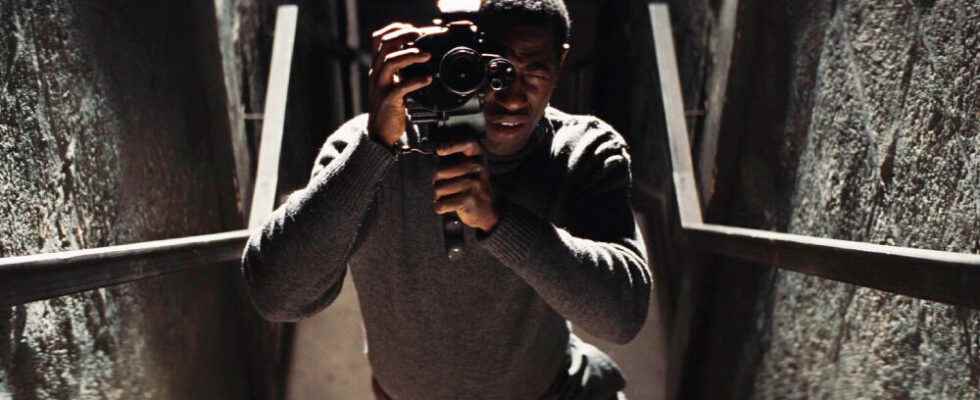Quentin Tarantino has stepped on the toes of various critics in his career. However, his 2009 war film Inglourious Basterds was watched with eagle eyes. Because after the B-movie revenge fantasies Kill Bill and Death Proof, Tarantino also dealt with the cinematic representation not only of the Second World War, but also of the Holocaust. In particular, the finale of the film, which will be shown today at 11:35 p.m. on ZDFneo.
Why Inglourious Basterds heralds a new Tarantino era
Inglourious Basterds is one of Quentin Tarantino’s best films and marks the beginning of a new era in the pulp fiction director’s work. Previously, Tarantino worked first and foremost on film history, from the gangster film Reservoir Dogs to the grindhouse contribution Death Proof. Of course, film and above all genres continue to play a major role, but with Inglourious Basterds that has shifted staging from reality to focus: namely history.
Check out the trailer for Inglourious Basterds:
Inglourious Basterds – Trailer 2 (German)
Basterds recreates the war and genocide of European Jews in a fictional plot inspired by war films like The Dirty Dozen and Kill Them All and Return Alone. Django Unchained and The Hateful 8 followed this pattern, tackling slavery and the aftermath of the Civil War. And in Once Upon a Time…in Hollywood, Tarantino addressed the murder of Sharon Tate and her friends at the hands of members of the Manson family.
Looking at his most recent film, Inglourious Basterds seems like that Blueprint of Tarantino’s work over the past decade. And that’s especially true at the end. Because Tarantino not only processes real history in fictional scenarios. He kind of rewrites history in Basterds and also in Once Upon a Time… :
How was the ending of Inglourious Basterds 2009 received?
The story about the Jewess Shoshanna Dreyfus (Mélanie Laurent) and the dirty dozen under Aldo Raine (Brad Pitt), who are trying to eliminate the leadership of the National Socialists at the same time, is known to take some liberties with the real historical processes.
The Basterds ending: ‘tasteless’ and ‘frighteningly insensitive’?
The sensation was correspondingly great after Inglourious Basterds celebrated its premiere in 2009 in what was incidentally a spectacular Cannes vintage (Antichrist! Enter the Void! The White Ribbon!). Basterds became the Discussion material in feuilletons, blogs and books like probably no other Tarantino film before or after.
Why Once Upon a Time in Hollywood is Tarantino’s underrated masterpiece
As Ty Burr summed it up in the Boston Globe: “You take a Tarantino film seriously at your peril, which is why Inglourious Basterds his biggest risk yet is: an entertaining action-comedy about – listen – the Holocaust.” And:
It’s obviously asking too much of one clever kid — which Tarantino still is at 46 — to expect it to deal with the story in some meaningful way.
David Denby in The New Yorker referred to the film as “ridiculously and frighteningly insensitive”. Wendy Ide saw one for Britain’s Times (via Rotten Romatoes). “rough, infantile and deeply tasteless” Movie.
J. Hoberman of the Village Voice saw a film that “Enables Jews to behave like Nazis by participating in cold-blooded massacres and mass incinerations, which through wish-fulfillment almost psychotic break with reality forced.”
Warning, here are spoilers for the end of Inglourious Basterds.
Tarantino comes of age: The Inglourious Basterds ending also received praise
For Rüdiger Suchsland, however, Inglourious Basterds was Tarantino’s best film at the time trust something that German cinema shies away from:
To show the dead Hitler, to damage his face and thus the myth itself, the undead revenants of history to let die, that’s what this film does. That, too, could act as a liberation.
Georg Seeßlen (Spiegel), who also published a book about Inglourious Basterds with “Quentin Tarantino gegen die Nazis”, wrote of a “radical gesture” that meant the end of the Tarantino film:
Perhaps that lies in this radical gesture Tarantinism coming of age. As paradoxical as this process of sacrifice may be: the dream location is sacrificed for reality, but only in a dream for which reality is sacrificed. […] ‘Pulp fiction’ conquers the fascist kitsch of death. This director hits the swirling images of the dangerous embrace of discourse and Nazi imagery with a baseball bat.
You can see the film for yourself on TV. After so much Tarantino “history ham” it’s easy to overlook just how unusual, surprising and, yes, radical Inglourious Basterds 2009 seemed. It’s therefore worth watching the film again with this awareness, because its concept and ending can still be argued about 10 years later
*. . .
